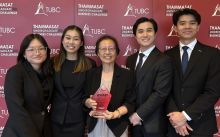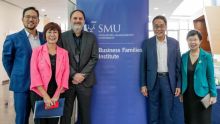Leadership more than a set template, says Dame Jacinda Ardern
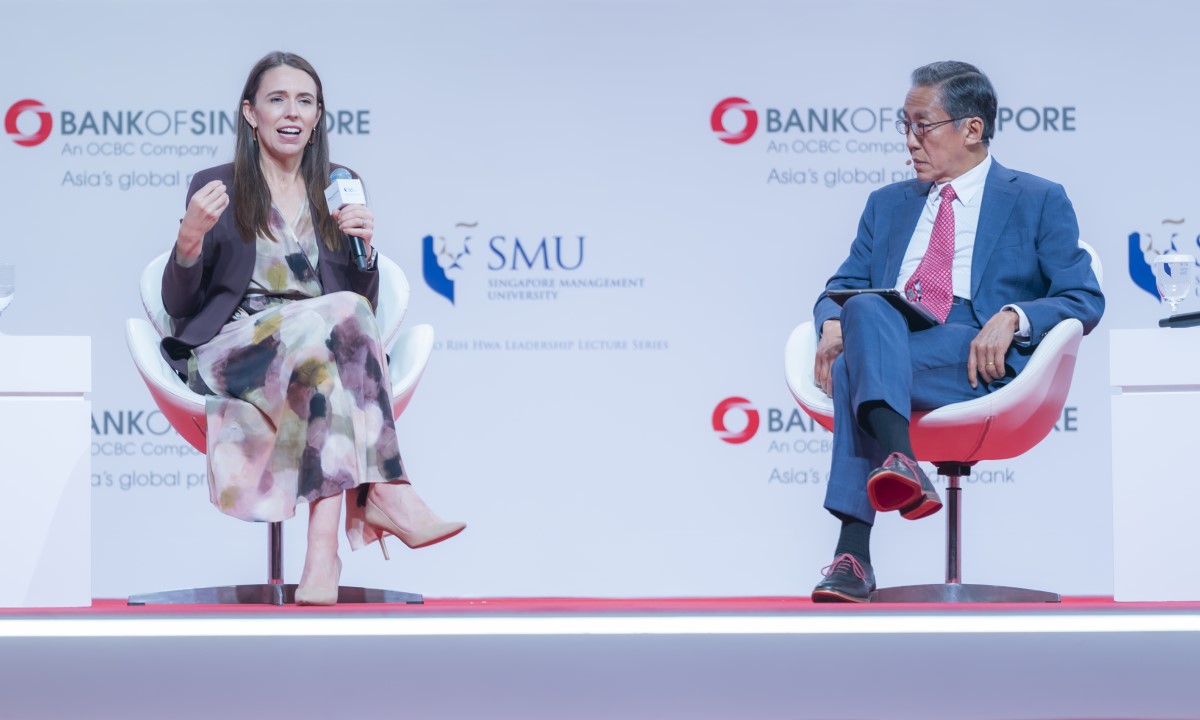
Held in partnership with the Bank of Singapore on 8 November 2023, the latest session of the Ho Rih Hwa Leadership Lecture series saw Dame Jacinda Ardern, the former Prime Minister of New Zealand, share her experiences and perspectives in a conversation with Mr Ho Kwon Ping, the founding and former Chairman of the Board of Trustees of Singapore Management University, and a long-time friend of the Bank of Singapore.
The invite-only event was held at the Sands Grand Ballroom at Marina Bay Sands, and was attended by the Bank of Singapore’s partners, including many prominent industry leaders, as well as SMU students who were especially eager to hear from Ms Ardern, as evidenced by how quickly the limited slots were snapped up.
Ms Ardern was New Zealand’s third female Prime Minister, and also its youngest prime minister in more than 150 years. Her five-and-a-half years in office saw her steering the country through the March 15 Christchurch mosques terrorist attacks, the White Island volcanic eruption, and the COVID-19 pandemic.
Even after leaving politics, she remains a passionate advocate for climate action, another priority that resonates deeply with SMU’s Vision 2025.
This event was Ms Ardern’s first speaking engagement in Singapore since she stepped down as New Zealand’s Prime Minister, and it highlights her belief that academic institutions play a key role in searching for answers to society’s biggest questions.
Seeing beyond cynicism
Thus far, SMU’s Ho Rih Hwa Leadership Lecture series has served as a distinguished and enriching platform that has hosted Nobel laureates and former Heads of States. Over the past 21 years, the lectures have inspired students and the public with the views and valuable opinions of these accomplished individuals from within and beyond the Asia-Pacific region.
In interacting with these leaders, you often discover that their motivations to take on the leadership role can vary widely. This was no different for Ms Ardern, who said her goal had never been to become a politician – in fact she candidly shared that she is not the type to have a detailed life. Rather, she saw politics as an effective way to make positive change, a belief that she still holds after her 15 years in the field.
Mr Ho expressed his surprise when she said that her time in politics has not disillusioned her. He asked her how one could not become cynical, particularly in areas that Ms Ardern has directed her recent efforts into: climate change, governments and politicians.
“Because of individual people,” was Ms Ardern’s response. “When I was in office, I think it’s fair to say we had our fair share of challenges,” she reflected, referring to difficult events such as the March 15 “Christchurch mosques” terrorist attacks, the White Island volcanic eruption, and the COVID-19 pandemic.
“In every scenario, I can share with you stories of extraordinary people who did extraordinary things because of their sense of humanity, because of their generosity, because of their kindness. So the things that you think would make me cynical, actually make me more optimistic.”
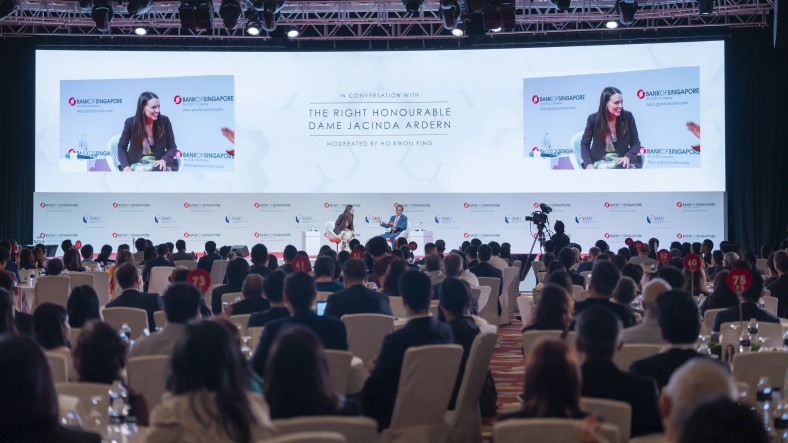
Female leadership in male-dominated areas
During the session, the topic of female leaders and their unique circumstances in a world that is still largely male-dominated was naturally brought to the fore. Across the world, a majority of political leaders are male – this image naturally influences what comes to mind when told to “visualise a capable leader”, as Ms Ardern did.
“It has been a male-dominated workplace, and as a result of that, we build in our mind’s eye a template around what we believe are the traits and characteristics you need to succeed,” said Ms Ardern.
“The same could be said of a whole range of professions that we become familiar with. If we are exposed to the same types of behaviour, we then build an assumption that that is what you need to succeed in that role.”
“Brash, relatively thick-skinned to endure a challenging environment” are just some of the assumptions that we might have when it comes to a successful politician, noted Ms Ardern, before sharing that she never saw herself successfully fitting into that template.
However, she rapidly found herself faced with a choice: to mould herself into the template and change who she was, or to hold on to what she believed was important and the traits that defined her.
She chose the latter, leading to her remarkable time in office, in which she greeted crises such as the Christchurch terrorist attacks with sensitivity and empathy – traits which she had previously thought could be used as a weakness, but which she found empowered her own decision making.
“In trauma and crisis I would think about the needs of the victims in that moment. It made my job feel harder, probably because I was a little more sensitive to criticism, but I do believe it was a strength in terms of the way it made me perform,” Ms Ardern reflected.
“Ultimately, my view is that those things that in the ‘template’ of leadership [that] we have traditionally painted as weaknesses, are in fact strengths. And my hope is that over time, those traits that we value, like kindness and humility, will be the traits of good political leaders as well.”
Ms Ardern’s words clearly resonated with a lot of the audience, especially women who might often find themselves in positions of leadership in fields that are dominated by males. Taking inspiration from her example, perhaps the answer for them lies not in getting rid of what are thought to be weaknesses as they stand alongside their peers, but rather in using those traits as unique strengths that empower decision-making from a different perspective.
The leadership lecture was also teamed with an event that saw SMU alumni present their startups – Margorium and Wasna, which are both trying to tackle sustainability issues in the areas of plastic waste and ethical meat production.
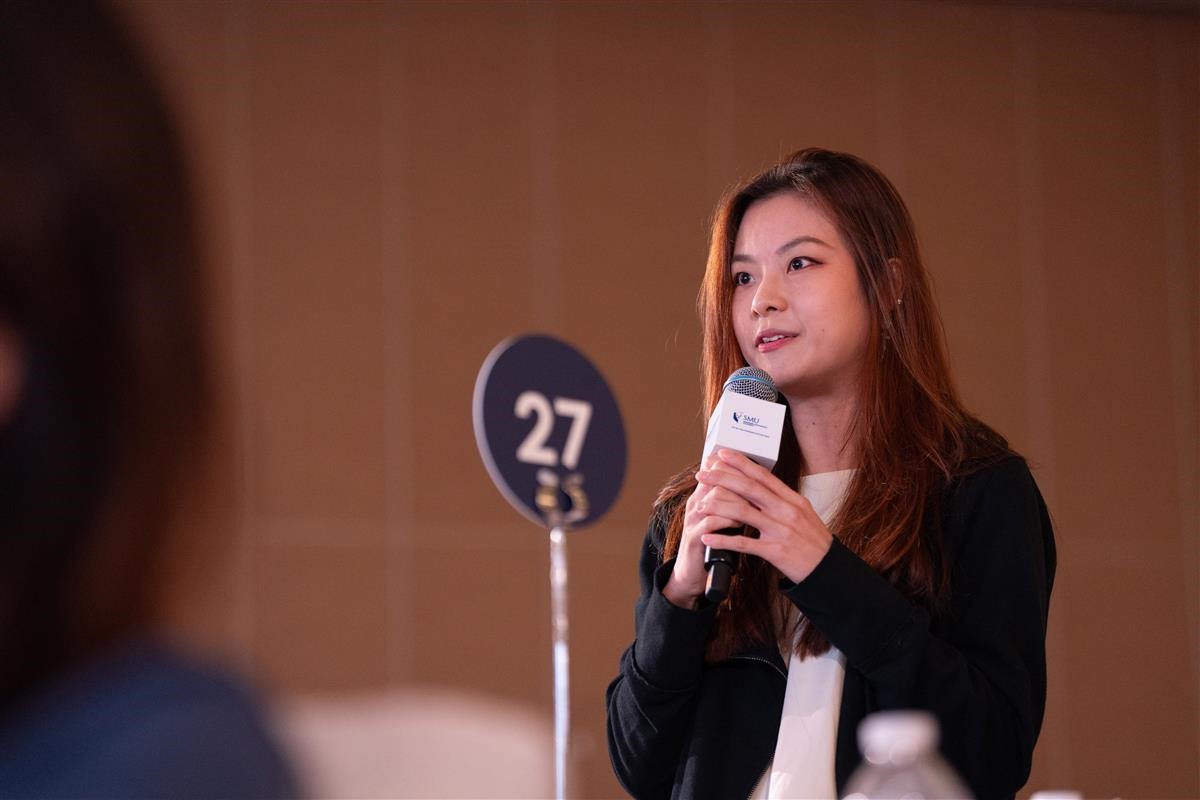
Drawing the event to a close, Mr Ho asked Ms Ardern to share what her greatest hopes and fears for the future are. Her answer was particularly pointedly aimed at the young in the audience:
“What gives me the most hope is this next generation. What worries me is if they lose their curiosity or their bravery. If I could leave something with the room: never stop being curious and never stop being brave. We need both in equal measure.”

